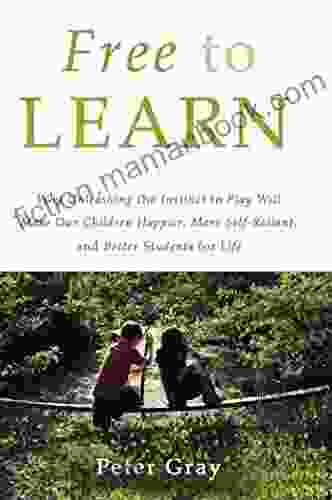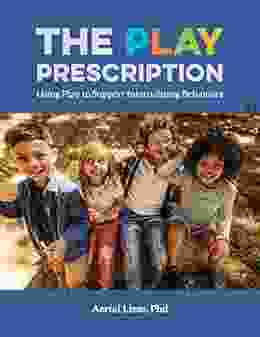Using Play to Support Internalizing Behaviors

5 out of 5
| Language | : | English |
| Text-to-Speech | : | Enabled |
Internalizing behaviors, such as anxiety, depression, and withdrawal, are common challenges faced by children. These behaviors can significantly impact a child's emotional well-being, social development, and overall functioning. Traditional therapeutic approaches often rely on talk therapy, which may not always be effective for children who struggle to express their emotions verbally. Play, on the other hand, provides a natural and engaging medium for children to explore and process their inner experiences.
What are Internalizing Behaviors?
Internalizing behaviors are characterized by an inward focus and include:
* Anxiety: Excessive worry, fear, or avoidance of certain situations or objects. * Depression: Persistent feelings of sadness, hopelessness, or anhedonia (loss of interest in activities). * Withdrawal: Social isolation, avoidance of social interactions, or a lack of interest in activities they once enjoyed.
The Role of Play in Addressing Internalizing Behaviors
Play is a natural and essential activity for children. It provides a safe and engaging environment where they can:
* Express and process emotions: Through play, children can symbolically represent and explore their inner experiences, which can help them make sense of and process their emotions. * Develop coping mechanisms: Play allows children to experiment with different ways of coping with challenging situations. They can learn how to manage their emotions, solve problems, and develop resilience. * Build resilience: Through play, children can build a sense of self-efficacy and confidence. They can learn how to overcome challenges, persevere, and adapt to new situations.
Types of Play for Internalizing Behaviors
There are various types of play that can be beneficial for children with internalizing behaviors, including:
* Symbolic play: Pretend play where children can create their own worlds and stories, allowing them to express and process their emotions and experiences. * Constructive play: Building or creating with materials such as blocks or play dough, which can help children develop problem-solving skills and a sense of mastery. * Cooperative play: Engaging in play with others, which can help children develop social skills, learn how to cooperate and negotiate, and build relationships. * Active play: Physical activities such as running, jumping, or playing sports, which can help children release pent-up energy and improve their mood.
How to Incorporate Play into Therapy
Incorporating play into therapy for children with internalizing behaviors involves:
* Establishing a safe and supportive environment: Creating a non-judgmental and accepting space where children feel comfortable expressing themselves through play. * Observing and assessing play: Paying attention to the child's choice of play materials, themes, and behaviors can provide valuable insights into their inner experiences. * Facilitating play: Encouraging and supporting the child's play, providing guidance and assistance as needed, and facilitating discussions about the child's experiences and emotions. * Reflecting and interpreting play: Helping the child make connections between their play and their real-life experiences, promoting self-awareness and emotional understanding.
Benefits of Using Play for Internalizing Behaviors
Research has shown that play-based therapy can be an effective intervention for addressing internalizing behaviors in children. Benefits include:
* Reduced anxiety and depression symptoms: Play can help children manage their emotions, develop coping mechanisms, and build resilience, leading to a reduction in anxiety and depressive symptoms. * Improved social skills: Play provides opportunities for children to interact with others, develop social skills, and build relationships, which can be particularly beneficial for children who experience social withdrawal. * Enhanced emotional expression: Play allows children to express and process their emotions in a safe and non-threatening environment, promoting emotional awareness and self-regulation. * Increased self-esteem and confidence: Through play, children can experience success and a sense of mastery, which can lead to increased self-esteem and confidence.
Play is a powerful tool that can be effectively used to support children with internalizing behaviors. By providing a safe and engaging environment, play allows children to express and process their emotions, develop coping mechanisms, and build resilience. Incorporating play into therapy can significantly improve children's emotional well-being, social development, and overall functioning.
5 out of 5
| Language | : | English |
| Text-to-Speech | : | Enabled |
Do you want to contribute by writing guest posts on this blog?
Please contact us and send us a resume of previous articles that you have written.
 Top Book
Top Book Novel
Novel Fiction
Fiction Nonfiction
Nonfiction Literature
Literature Paperback
Paperback Hardcover
Hardcover E-book
E-book Audiobook
Audiobook Bestseller
Bestseller Classic
Classic Mystery
Mystery Thriller
Thriller Romance
Romance Fantasy
Fantasy Science Fiction
Science Fiction Biography
Biography Memoir
Memoir Autobiography
Autobiography Poetry
Poetry Drama
Drama Historical Fiction
Historical Fiction Self-help
Self-help Young Adult
Young Adult Childrens Books
Childrens Books Graphic Novel
Graphic Novel Anthology
Anthology Series
Series Encyclopedia
Encyclopedia Reference
Reference Guidebook
Guidebook Textbook
Textbook Workbook
Workbook Journal
Journal Diary
Diary Manuscript
Manuscript Folio
Folio Pulp Fiction
Pulp Fiction Short Stories
Short Stories Fairy Tales
Fairy Tales Fables
Fables Mythology
Mythology Philosophy
Philosophy Religion
Religion Spirituality
Spirituality Essays
Essays Critique
Critique Commentary
Commentary Glossary
Glossary Bibliography
Bibliography Index
Index Table of Contents
Table of Contents Preface
Preface Introduction
Introduction Foreword
Foreword Afterword
Afterword Appendices
Appendices Annotations
Annotations Footnotes
Footnotes Epilogue
Epilogue Prologue
Prologue Emily Josephine
Emily Josephine Elle Ingalls
Elle Ingalls Camilla Pang
Camilla Pang Peter Swan
Peter Swan Peter Robison
Peter Robison Faith Borkowsky
Faith Borkowsky Simon Sommerville
Simon Sommerville Carol D Guerrero Murphy
Carol D Guerrero Murphy Eric Balchunas
Eric Balchunas Simone Cave
Simone Cave Hugh Morrison
Hugh Morrison Jose De La Roca
Jose De La Roca Gordon Mackenzie
Gordon Mackenzie Safia Elhillo
Safia Elhillo Kathleen Sheeder Bonanno
Kathleen Sheeder Bonanno Steven Becker
Steven Becker Joel T Nigg
Joel T Nigg Marina Viola
Marina Viola Nicola Salmon
Nicola Salmon Carmen Beatty
Carmen Beatty
Light bulbAdvertise smarter! Our strategic ad space ensures maximum exposure. Reserve your spot today!
 DeShawn PowellFollow ·12.7k
DeShawn PowellFollow ·12.7k Clark CampbellFollow ·3.1k
Clark CampbellFollow ·3.1k Gerald ParkerFollow ·4.5k
Gerald ParkerFollow ·4.5k Alexandre DumasFollow ·16.6k
Alexandre DumasFollow ·16.6k Richard WrightFollow ·13.7k
Richard WrightFollow ·13.7k Miguel de CervantesFollow ·8.9k
Miguel de CervantesFollow ·8.9k Branson CarterFollow ·3.6k
Branson CarterFollow ·3.6k Floyd PowellFollow ·13.7k
Floyd PowellFollow ·13.7k

 Abe Mitchell
Abe MitchellWhy Unleashing the Instinct to Play Will Make Our...
Play is an essential part of childhood. It is...

 Rubén Darío
Rubén DaríoTheory in Health Promotion Research and Practice
Theory is essential...

 Howard Blair
Howard BlairFailing Students or Failing Schools: Uncovering the Root...
In the United States, the issue of failing...

 Ira Cox
Ira CoxPoetry From the Heart Chope: A Symphony of Soul and Verse
Embark on a literary...

 Easton Powell
Easton PowellThe Witch Hunt: Wicked Witches of Shadow Woods
In the cursed woods of...
5 out of 5
| Language | : | English |
| Text-to-Speech | : | Enabled |














